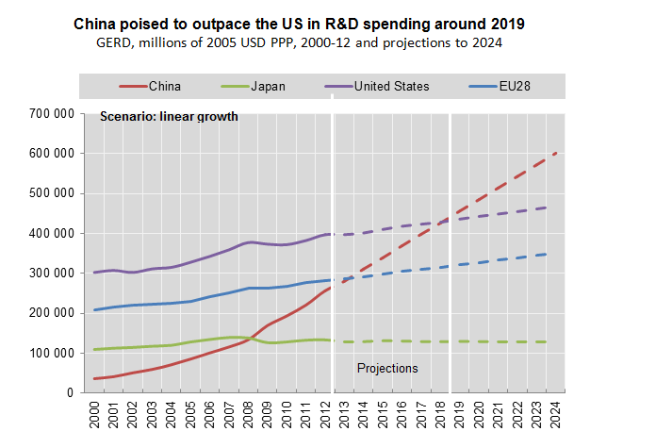OECD says:
- Squeezed R&D budgets in the EU, Japan and US are reducing the weight of advanced economies in science and technology research, patent applications and scientific publications and leaving China on track to be the world’s top R&D spender by around 2019, according to a new OECD report.
- The OECD Science, Technology and Industry Outlook 2014 finds that with R&D spending by most OECD governments and businesses yet to recover from the economic crisis, the OECD’s share in global R&D spending has slipped from 90% to 70% in a decade.
- Annual growth in R&D spending across OECD countries was 1.6% over 2008-12, half the rate of 2001-08 as public R&D budgets stagnated or shrank in many countries and business investment was subdued. China’s R&D spending meanwhile doubled from 2008 to 2012.
- Gross domestic expenditure on R&D (GERD) in 2012 was USD 257 billion in China, USD 397 billion in the United States, USD 282 billion for the EU28 and USD 134 billion in Japan.
These estimates are not purchasing power adjusted, so countries with lower costs of doing research and development will be under reported here, and those with higher costs may be over estimated.
The data don't at this level separate fundamental research (with results that will be published openly and available in all countries) versus proprietary R&D that may well give a country an advantage in international trade. The growth of Chinese (and Indian) support for fundamental research should be a good thing, benefiting people in all countries; essentially China with its long term rapid economic growth is assuming a more proper place relative to its huge population in the production of scientific knowledge and understanding. On the other hand, the United States might be well advised to seek ways to increase its R&D for the production of new technologies to meet coming challenges from other nations.
Of course, there is an argument that the growth of the global economy is "a tide that lifts all ships". More affluent people buying more goods and services on international markets can mean a better life in all nations.

No comments:
Post a Comment